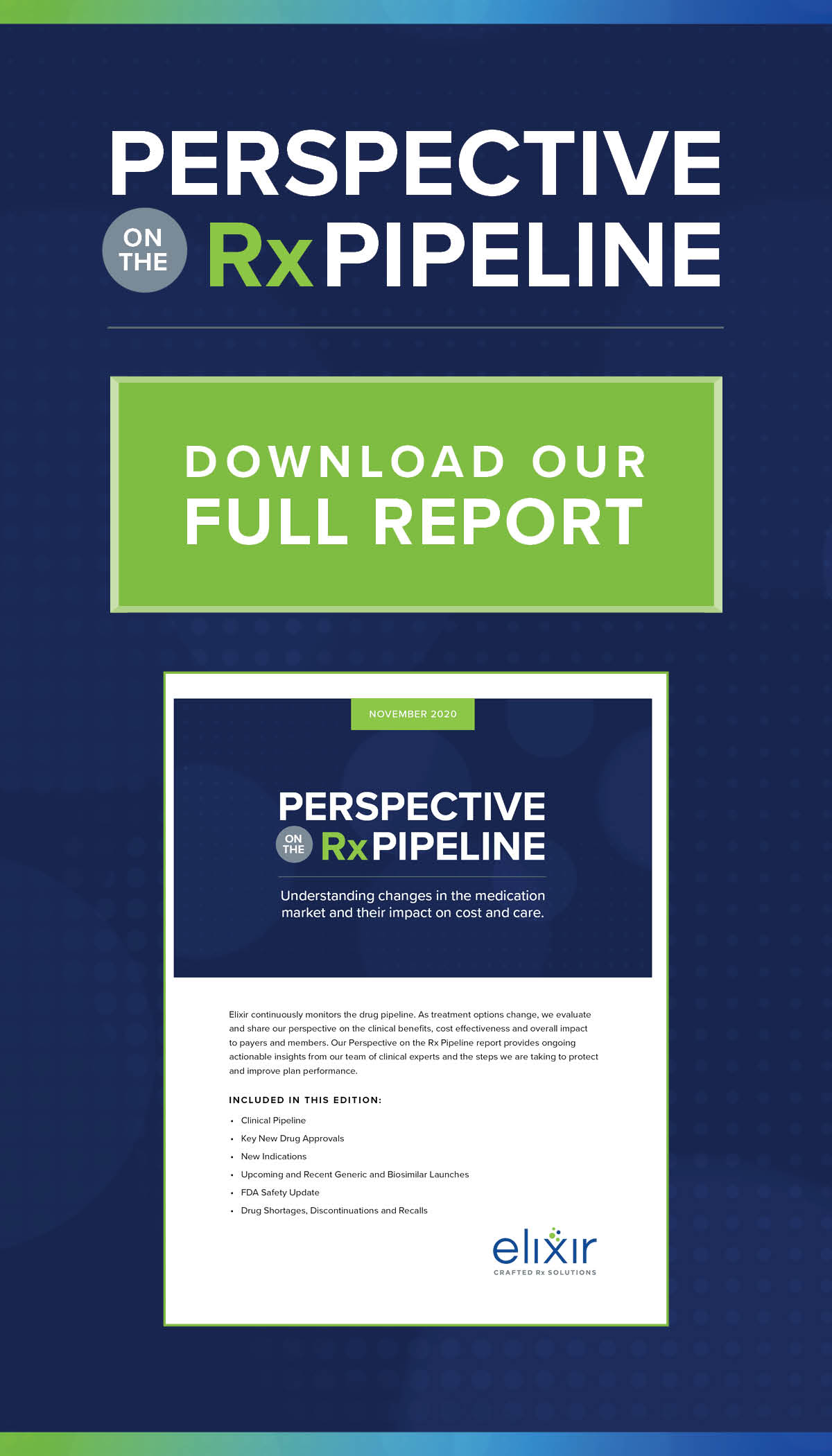From development of nasal spray to treat dry eye disease to approval of the first Alzheimer's disease treatment in nearly 20 years, learn about the most impactful changes at each stage of the drug pipeline in this edition of Perspective on the Rx Pipeline.
Perspective on the Rx Pipeline
Clinical Pipeline
Within the extensive pipeline of drugs preparing for market launch, these are the three most notable drugs plan sponsors should be aware of:
- Korsuva™, if FDA-approved, would treat uremic pruritus, a common symptom of end-stage kidney disease that greatly impacts the quality of life and currently has limited treatment options available.
- OC-01, currently on the market as the smoking cessation drug Chantix®, is being reformulated as a nasal spray to treat dry eye disease (DED). While there are a number of treatment options in the pipeline for DED, this would be the first DED nasal spray, if approved.
- OMS721 has been granted FDA breakthrough therapy for the treatment of transplant-associated thrombotic microangiopathy (TA-TMA), which some transplant patients develop and has a high mortality rate, despite current treatments.
Drug Approvals
Six drugs recently approved by the FDA include:
- Abecma® (idecabtagene vicleucel), the first FDA-approved chimeric antigen receptor T-cell (CAR-T) immunotherapy for the treatment of multiple myeloma.
- Aduhelm™ (aducanumab-avwa), the first FDA-approval of a treatment for Alzheimer's disease in almost 20 years, although it will require additional clinical trials to verify efficacy.
- Kloxxado™ (naloxone hydrochloride) was approved for the treatment of opioid overdose and delivers a higher dose than naloxone.
- Nextstellis® (drospirenone; estetrol), an oral contraceptive for the prevention of pregnancy that contains a unique naturally occurring estrogen that could potentially improve the side effect profile associated with oral contraceptives.
- Qelbree™ (viloxazine hydrochloride), a non-stimulant option for the treatment of attention deficit hyperactivity disorder (ADHD).
- Rybrevant™ (amivantamab-vmjw), the first targeted treatment option for those with locally advanced or metastatic non-small cell lung cancer (NSCLC) with epidermal growth factor receptor (EGFR) exon 20.
New Indications
Drugs that have gained FDA approval for the treatment of additional diseases and/or conditions and have potential to be impactful include:
- Humira® (adalimumab), received an approved age reduction to treat ulcerative colitis in patients five years of age and older.
- Evekeo® (amphetamine sulfate), expanded to treat children as young as three years of age with ADHD.
- Farxiga® (dapagliflozin), expanded to reduce the risk of sustained estimated glomerular filtration rate decline, end-stage kidney disease, cardiovascular death and hospitalization for heart failure in adults with chronic kidney disease.
- Nurtec® ODT (rimegepant), the first oral calcitonin gene-related peptide (CGRP) receptor antagonist to receive the expanded indication for the prevention of episodic migraine in adults.
- Zeposia® (ozanimod), the first sphingosine 1-phosphate receptor modulator approved to treat ulcerative colitis.
Generic Approvals
There are several new generic product offerings to the marketplace, including drugs for the treatment of multiple sclerosis, HIV and diabetes. A review of generic launches, including biosimilars, is provided in the full report.
Download the full report for more information, including important safety updates and drug shortages and discontinuations.


